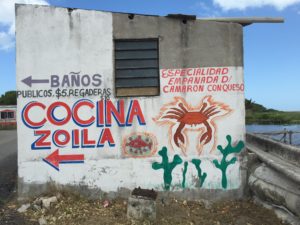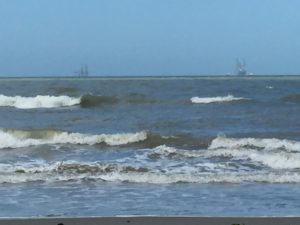Why Marine Conservation?
 Our environment and its many elements are priceless. The air we breathe, the water we drink, the land upon which we live, and the other natural resources that sustain us are the basis of our existence. The communities in which we live, the work at which we toil, and our families which give us purpose are guided by and dependent upon these gifts of nature. And this is no less true for our marine resources, including the sea grass meadows, the sandy beaches, the mangrove forests, fish and shellfish of all kinds, coral reefs, sea turtles, marine mammals, and the many ecosystems and other forms of life by which we are sustained. Some of these things we utilize for our sustenance. Some we seek only to preserve, knowing the indispensably important role they play in the overall marine ecosystem. And for all of them, we strive to ensure they are sustained for future generations to enjoy and value.
Our environment and its many elements are priceless. The air we breathe, the water we drink, the land upon which we live, and the other natural resources that sustain us are the basis of our existence. The communities in which we live, the work at which we toil, and our families which give us purpose are guided by and dependent upon these gifts of nature. And this is no less true for our marine resources, including the sea grass meadows, the sandy beaches, the mangrove forests, fish and shellfish of all kinds, coral reefs, sea turtles, marine mammals, and the many ecosystems and other forms of life by which we are sustained. Some of these things we utilize for our sustenance. Some we seek only to preserve, knowing the indispensably important role they play in the overall marine ecosystem. And for all of them, we strive to ensure they are sustained for future generations to enjoy and value.

So, do these marine resources have value? Most certainly! But from what does that value originate? And is the value associated with these resources only in terms of money, or is there other value that exists? Businesses generate economic activity. When fish are caught and sold, when tourists pay to swim with whale sharks, when boaters patronize waterfront cafes, when recreational anglers pay for a fishing trip, when cargo ships load and offload containers of needed products, when snorkelers and divers pay to enjoy a coral reef to name a few. These activities generate transactions between buyers and sellers and create “value” in terms of money in people’s pockets. That money comes from markets and is spent and re-spent in local economies, which in turn creates sales, incomes, taxes, and jobs. Economists would further argue that additional value is revealed by the fact the many of us would actually pay more to utilize our resources than we currently do … which is referred to as surplus. But some may argue that most of the value associated with our marine resources comes from something other than buying and selling in markets. What are these “other” values?
 Not all value derived from our marine resources comes from markets. Marine resource scientists and managers have long recognized these other sources of “value”. Marine resources provide environmental services that benefit us all, not just those of us who participate in the aforementioned markets and activities. Mangrove forests and beaches provide protection from storm events. Salt marshes provide filtration for ground water. Estuaries and sea grass meadows provide nursery and sanctuary areas for many, many important species. Oceans provide oxygen for us to breathe and impact our local weather and climate. The water surface provides a mode for transportation. These and other elements of our marine ecosystem create benefits for the community at large. They provide “value” because without them we would be forced to expend money to accomplish what they do for us. But the sources of non-market value doesn’t stop there. Marine resources also give us a sense of community and often form the basis of our cultural heritage. Our history, our cultural heritage, even the sense of who we are, these things are often directly linked to the oceans and their resources. They create massive “value” that could never be replaced with any amount of money!
Not all value derived from our marine resources comes from markets. Marine resource scientists and managers have long recognized these other sources of “value”. Marine resources provide environmental services that benefit us all, not just those of us who participate in the aforementioned markets and activities. Mangrove forests and beaches provide protection from storm events. Salt marshes provide filtration for ground water. Estuaries and sea grass meadows provide nursery and sanctuary areas for many, many important species. Oceans provide oxygen for us to breathe and impact our local weather and climate. The water surface provides a mode for transportation. These and other elements of our marine ecosystem create benefits for the community at large. They provide “value” because without them we would be forced to expend money to accomplish what they do for us. But the sources of non-market value doesn’t stop there. Marine resources also give us a sense of community and often form the basis of our cultural heritage. Our history, our cultural heritage, even the sense of who we are, these things are often directly linked to the oceans and their resources. They create massive “value” that could never be replaced with any amount of money!

And guess what? These vitally important resources belong to us all. Though many try, none can claim ownership. The responsibility for sustainable use and, ultimately, the wise use of these limited resources, falls on each of us. This wise use is a collective effort that involves us all. Thus, we can collectively choose to use our limited marine resources in a sustainable manner, and allow these values to continue, or we can collectively choose to abuse and mismanage these limited marine resources. If we follow the latter course, these marine resources may be depleted in the near future. If that happens, then all the economic value and benefits we have enjoyed in the past and had hoped to enjoy into the future will be gone.
So, do your marine resources have value? Yes, they do. Most of these values extend well beyond what only our markets can create. These values are an intrinsic part of our communities, our heritage, our livelihoods, and our environment. They form the very basis for our existence. Monetary value? That is the least of it. A livelihood and career that seeks to sustain our marine resources has a value beyond measure. They are priceless! Your marine resources have value!! They are the true Treasures of the Caribbean! So, use them wisely. Pass them on!!
Charles M. Adams PhD, – University of Florida



